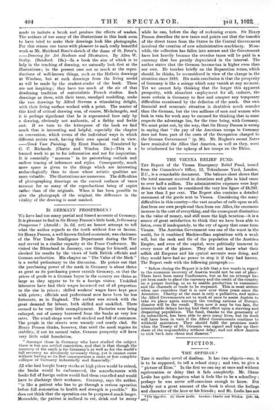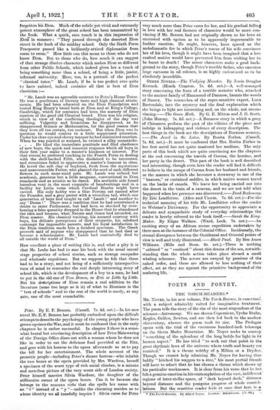FICTION.
THE OPPIDAN.*
Tins is another novel of dualism. It has two objects---one, it is to be supposed, to tell a school story ; and two, to give a " picture of Eton." In the first we can say at once and without equivocation• or delay that it fails completely. Mr. Shane Leslie has quite forgotten what it feels like to be a schoolboy : perhaps he was never self-conscious enough to know. But luckily not a great amount of the book is about the feelings and character of the hero or his friends ; and Mr. Leslie has •not • The Oppidan. By Shane Untie. London: Cheat° and Winston. (its. GIL net-.) forgotten his Eton. Much of the subtle yet vivid and extremely potent atmosphere of the great school has been transmitted by the nook. What a quick, sure touch is in thiti impression of Etori in summer : " They passed through the deserted Eton street in the hush of the midday school. Only the Sixth Form Praepostor passed like a brilliantly-attired diplomatist from room to room." How little can this mean to those who do not know Eton. But to those who do, how much it can suggest of that strange illusive character which makes Eton so different from other Public Schools, which indeed gives her a touch of
being something more than a school, of being a little, junior, informal university. Here, too, is a portrait of the perfect " classical tutor." Mr. Lamb, if he is too perfect ever quite to have existed, indeed contains all that is best of Eton classicism :—
" Mr. Lamb was an agreeable contrast to Peter's House Tutor. Ho was a gentleman of literary taste and high classical attain- ments. He had been educated on the Eton Foundation and tasted King Henry's bread both at Eton and at King's College, Cambridge, which for centuries had been the nursery of Eton masters of the good old Classical brand. Eton was his religion, which in view of the conflicting theologies of the day was sufficing. Vulgarity and fanaticism he disapproved, as ho disapproved Science or Mathematics, for the good reason that they wore all too certain, too cocksure. But when Eton was in question ho would confess to a little suppressed adoration. Under his clear eye and cheery manner ho had minimized emotion. When he was puzzled or amused, he twisted a silky moustache. . . . He liked the immediate gratitude and filial obedience of new boys, the quick and innocent response which all boys in their first year make to a master's kindness or interest. For that reason ho preferred teaching in the Fourth Form to dealing with the shell-backed Fifth, who disdained to be interested, and sometimes failed to appreciate a master's humour in class. He loved the soft clay of boyhood, fresh from the mysterious and unaccountable Potter, who planted the seed of such different flowers in such same-sized pots. Mr. Lamb was refined but academic, generous but a little sanguine, conventional to Eton standards and as artistic as he dared. His aesthetic side found harmless vont in the most exquisite of handwritings and in a facility for Latin verso which Cardinal Bombe might have envied. His only hobby was a blue Persian cat named after the Founder, and a grey parrot with a vermilion tail, which one generation of boys had taught to call ' Lamb ! ' and another- to say Damn I "Mere was a tradition that ho had entertained a desire to enter Parliament, but had boon so shocked by over- hearing a false quantity dropped in the House that he abandoned the idea and became, what Nature and Grace had intended, an Eton master. His classical training, his amused courtesy with boys, his delicate perceptions of their etiquette, his subdued contempt for impossible parents, and his loyal satisfaction in the Eton tradition made him a finished specimen. The Greek proverb said of anyone who disappeared that ho had died or become a schoolmaster. Mr. Lamb had contentedly died to all outside the world of Eton."
How excellent a piece of writing this is, and what a pity it is that Mr. Leslie has had to mar his book with the usual unreal stage properties of school stories, such as strange escapades and wholesale expulsions. But we suppose he felt that there had to be a story, and not being of a sufficiently introspective turn` of mind to remember the real deeply interesting story of school life, which is the development of a boy to a man, he had to put in the old one of Tont Brown, or Eric or Little by Little. But his degcriptions of Eton remain a real addition to the literature (none too large as it is) of what to Etonians is the " best of schools " and to the rest of the world is surely, at any rate, one of the most remarkable.



































 Previous page
Previous page